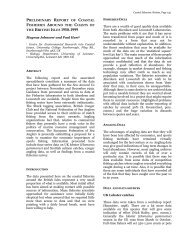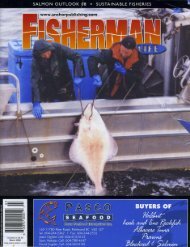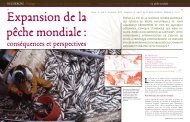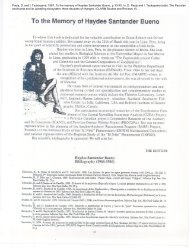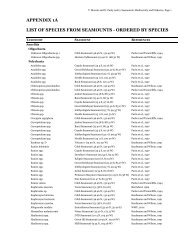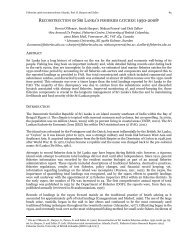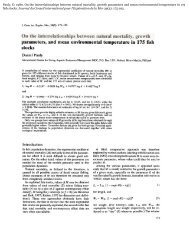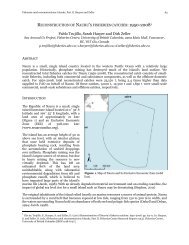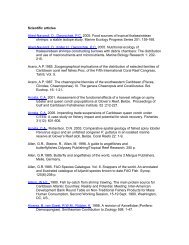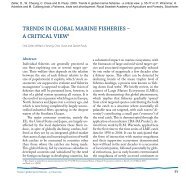Total marine fisheries extractions by country in the Baltic Sea
Total marine fisheries extractions by country in the Baltic Sea
Total marine fisheries extractions by country in the Baltic Sea
Create successful ePaper yourself
Turn your PDF publications into a flip-book with our unique Google optimized e-Paper software.
<strong>Total</strong> <strong>mar<strong>in</strong>e</strong> <strong>fisheries</strong> <strong>extractions</strong> <strong>by</strong> <strong>country</strong> <strong>in</strong> <strong>the</strong> <strong>Baltic</strong> <strong>Sea</strong>: 1950-present, Ross<strong>in</strong>g, Booth and Zeller 1<br />
DIRECTOR’S FOREWORD<br />
Illegal, Unreported and Unregulated (IUU) <strong>fisheries</strong>, which only a few years ago were considered to be<br />
ma<strong>in</strong>ly a problem for a limited number of regions or <strong>fisheries</strong> (e.g. Patagonian toothfish), have now been<br />
recognized as a substantial global issue of concern. The importance and negative impacts of IUU <strong>fisheries</strong><br />
catches have ga<strong>in</strong>ed <strong>in</strong>creas<strong>in</strong>g attention <strong>in</strong> <strong>the</strong> world‘s media, and also <strong>by</strong> <strong>fisheries</strong> scientists and<br />
managers. To account for IUU, catch reconstructions, such as those be<strong>in</strong>g conducted under <strong>the</strong> guidance<br />
of Dr. Dirk Zeller of <strong>the</strong> <strong>Sea</strong> Around Us Project, and documented <strong>in</strong> a previous Fisheries Centre Research<br />
Report (Vol. 15 (2), 2007) and <strong>in</strong> numerous peer-reviewed publications, show that <strong>fisheries</strong> statistics<br />
supplied <strong>by</strong> national, regional and <strong>in</strong>ternational scientific and management agencies generally<br />
underestimate actual catches often <strong>by</strong> substantial marg<strong>in</strong>s. While historically perceived to be largely a<br />
develop<strong>in</strong>g <strong>country</strong> problem, <strong>the</strong> <strong>in</strong>creas<strong>in</strong>g prevalence of vessel apprehension illustrates that IUU catches<br />
are also prom<strong>in</strong>ent <strong>in</strong> some of <strong>the</strong> most developed countries of <strong>the</strong> world. The countries surround<strong>in</strong>g <strong>the</strong><br />
<strong>Baltic</strong> <strong>Sea</strong> are predom<strong>in</strong>antly members of <strong>the</strong> European Union, and have a long history of <strong>mar<strong>in</strong>e</strong> resource<br />
use <strong>in</strong> <strong>the</strong> <strong>Baltic</strong> <strong>Sea</strong>. Yet, as <strong>the</strong> study presented <strong>in</strong> this report illustrates, even <strong>the</strong>se highly developed<br />
countries with <strong>the</strong>ir substantial resources and well established scientific, adm<strong>in</strong>istrative and management<br />
<strong>in</strong>stitutions, have so far failed to address <strong>the</strong> data issues stemm<strong>in</strong>g from IUU <strong>in</strong> a transparent and<br />
comprehensive manner. The effort reported <strong>in</strong> this report, conducted through fund<strong>in</strong>g from <strong>the</strong> <strong>Baltic</strong> <strong>Sea</strong><br />
2020 Foundation (www.balticsea2020.org/), should contribute to more transparent and complete<br />
account<strong>in</strong>g of total catches for <strong>Baltic</strong> <strong>Sea</strong> <strong>fisheries</strong>, and may even serve as a bluepr<strong>in</strong>t for all o<strong>the</strong>r Nor<strong>the</strong>ast<br />
Atlantic areas.<br />
In general, obta<strong>in</strong><strong>in</strong>g a complete account<strong>in</strong>g of total catches (or removals) from <strong>the</strong> global ocean is<br />
fundamental to our ability to manage <strong>mar<strong>in</strong>e</strong> fishery resources susta<strong>in</strong>ably for <strong>the</strong> benefits of both current<br />
and future generations. The work reported here<strong>in</strong> cont<strong>in</strong>ues an effort <strong>by</strong> <strong>the</strong> <strong>Sea</strong> Around Us Project,<br />
through its catch reconstruction work, to provide such account<strong>in</strong>g.<br />
Ussif Rashid Sumaila, Director<br />
UBC Fisheries Centre<br />
February 2010



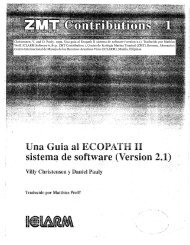

![Nacion.com, San José, Costa Rica [Nacionales] - Sea Around Us ...](https://img.yumpu.com/26166123/1/190x245/nacioncom-san-josac-costa-rica-nacionales-sea-around-us-.jpg?quality=85)
